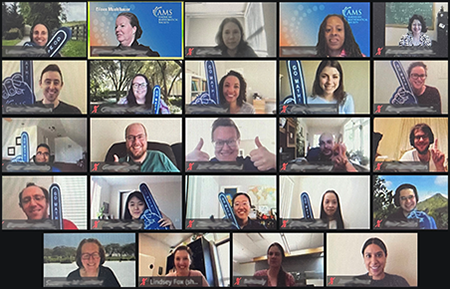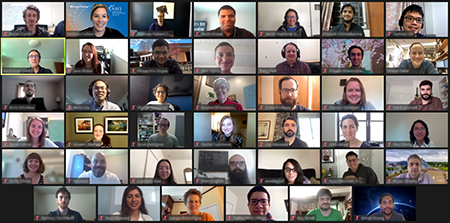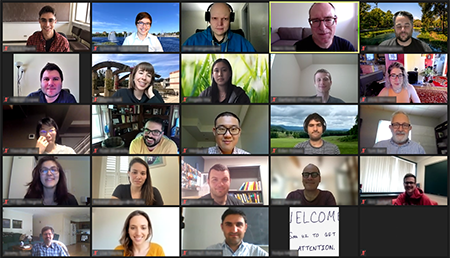Mathematics Research Communities - 2021
The 2021 Mathematics Research Communities (MRC) summer conferences were held virtually in June. The three week-long conferences brought 113 early-career mathematicians together with 20 senior organizers and several advisors and experts in a collaborative mathematics research experience. These conferences, funded through a generous three-year grant from the National Science Foundation, the AMS, and private donors, are part of the AMS program that includes special sessions at the Joint Mathematics Meetings (JMM), a longitudinal study, and continued connections and collaborations.
Enjoy the following highlights from the June 2021 MRC community and reactions from some of the participants.
“This conference was very hands-on and felt like a community was formed. We will be working on this project for some time in the future.”

Week 1a: May 30 – June 5, 2021
Dynamics of Infectious Diseases: Ecological Models Across Multiple Scales
Organizers: Julie Blackwood, Williams College; Lauren Childs, Virginia Tech; Suzanne Lenhart, University of Tennessee, Knoxville; Olivia Prosper, University of Tennessee, Knoxville
This workshop discussed the state of the field and developed methods to address recent and emerging issues related to multiple scales and relevant heterogeneities, such as the role of contact heterogeneity in the spread of infectious disease. It required knowledge and techniques from such mathematical areas as differential equations, difference equations, dynamical systems, probability, statistics and various natural sciences. Interdisciplinary collaboration was an essential component of the work.
Click here to see a list of the participants.
“Interactions among the group and between the groups, hands-on working rather than just sitting and listening to talks/tutorials…actually worked better (in my opinion) for our cohort due to the COVID postponement, and we could really get to know each other and started our project during the year before the summer.”
“I actually have a working research group at the end!”

Week 1b: May 30 – June 5, 2021
Combinatorial Applications of Computational Geometry and Algebraic Topology
Organizers: Stephen Melczer, University of Waterloo; Marni Mishna, Simon Fraser University; Robin Pemantle, University of Pennsylvania.
This workshop focused on the new and rapidly expanding area of Analytic Combinatorics in Several Variables (ACSV) concerning enumeration problems in such areas as lattice walks, statistical mechanical models, quantum walks and other exactly solvable models where asymptotic estimation of coefficients of a bivariate or multivariate generating function is required. Participants in this MRC were introduced to problems from singularity theory, algebraic topology, and computational algebra, whose solutions have direct applications to ACSV. In addition, participants had the opportunity to work with advisors Professors Yuliy Baryshnikov (University of Illinois, Urbana-Champaign) and Mark Wilson (University of Auckland/University of Massachusetts).
Click here to see a list of the participants.
“I found that the very hands-on approach of focused work on a problem in a small group where we could make good progress on in a week without distractions was really interesting and effective. This is a testament to the ability of the scientific coordinators to create the right atmosphere and give us the right level of problems to work on, and to the AMS staff for the smooth organization of the whole program.”

Week 2: June 6 – 12, 2021
Finding Needles in Haystacks: Approaches to Inverse Problems using Combinatorics and Linear Algebra
Organizers: Shaun Fallat, University of Regina; H. Tracy Hall, NewVistas LLC; Leslie Hogben, Iowa State University and the American Institute of Mathematics; Bryan Shader, University of Wyoming; Michael Young, Iowa State University.
This MRC conference provided participants with the expertise needed to launch productive research projects in inverse eigenvalue problems, which encompass many important problems in science and engineering and often can be reduced to the mathematical question of whether or not there is a matrix with a prescribed structure whose invariants (eigenvalues) have a desired property. Progress has been slow in these new lines of inquiry because particular inverse eigenvalue problems can be difficult—much like finding a needle in a haystack.
Click here to see a list of the participants.
“Any workshop when you work in small groups on an interesting topic is worthwhile and that definitely describes this conference. This was, I think, the first research-based workshop I’ve participated in and it’s definitely made me want to another one in the future!”

Week 3a: June 13 – 19, 2021
Analysis in Metric Spaces
Organizers: Mario Bonk, University of California at Los Angeles; Luca Capogna, Worcester Polytechnic Institute; Piotr Hajlasz, University of Pittsburgh; Nageswari Shanmugalingam, University of Cincinnati; Jeremy Tyson, University of Illinois at Urbana-Champaign
This MRC provided a focused long-term agenda for junior researchers on specific topics emphasized during this conference, which included Sobolev spaces on metric spaces, quasiconformal mapping theory, nonlinear potential theory and the calculus of variations, geometric measure theory, and notions of curvature in non-smooth spaces. These subjects were studied in a variety of non-smooth settings, including sub-Riemannian manifolds, fractals, and more general metric measure spaces. The workshop also featured two senior European experts (Pekka Koskela, University of Jyvaskyla, Finland, and Nicola Gigli, SISSA, Italy) who guided participants towards open problems and collaborative research in the field.
Click here to see a list of the participants.
“This is the first conference I have attended that allowed participants to discuss and focus on particular problems as the primary motivation for the conference, which was a fruitful experience.”
“Everyone walked away with a collaboration that they will cultivate on their own time.”

Week 3b: June 13 – 19, 2021
New Problems in Several Complex Variables
Organizers: Dusty Grundmeier, Harvard University; Loredana Lanzani, Syracuse University; Yunus Zeytuncu, University of Michigan–Dearborn
Recent synergies among investigators in several complex variables (SCV), analysis, geometry, Cauchy-Riemann (CR) geometry, and partial differential equations present a variety of major new problems that are amenable to investigation by early-career mathematicians. This workshop sought to solidify the pipeline of young researchers into SCV by creating a supportive community and by providing a gradual approach to research-level problems that will lead to sustainable, long-term research collaborations.
Click here to see a list of the participants.
“The daily interactions between participants…created a strong bond for the members.”
“By far the most useful part of the MRC was forming small research groups, which continue after the conference. It is likely at least one group I am in will ultimately produce a publication. In addition, I appreciate the relationships I made with other early career researchers…I am sure these relationships will be helpful in my future career.”
About the Program
The Mathematics Research Communities (MRC) is a professional development program offering early-career mathematicians a rich array of opportunities to develop collaborative research skills, build a network focused in an active research domain, and receive mentoring from leaders in that area. Funded through a generous three-year grant from the National Science Foundation, the AMS, and private donors, the MRC is a year-long experience that includes:
- Intensive one-week, hands-on research conference in the summer
- Special Sessions at the Joint Mathematics Meetings (JMM) in January following the summer conference
- Guidance in career building
- Follow-up small-group collaborations
- Longer-term opportunities for collaboration and community building among the participants
Those accepted into this program receive support for the summer conference, and are partially supported for their participation in the Joint Mathematics Meetings which follow in January. In addition, each participant is expected to provide continuing feedback regarding career development and the impact of the MRC program.
Since the inception of the MRCs in 2008, over 1,500 alumni from 48 different topical areas have participated in this program.
“The main difference between this conference and others I’ve attended was “the ability to actually begin a research collaboration in a structured, organized way, and then put intensive time into working on the problem(s) during the conference. I don’t know why more people don’t do this, but it’s amazing!”
More information on the upcoming 2022 MRC workshops.
More information about the MRC program.
Contact Information
For further information, please contact the Programs Department.







